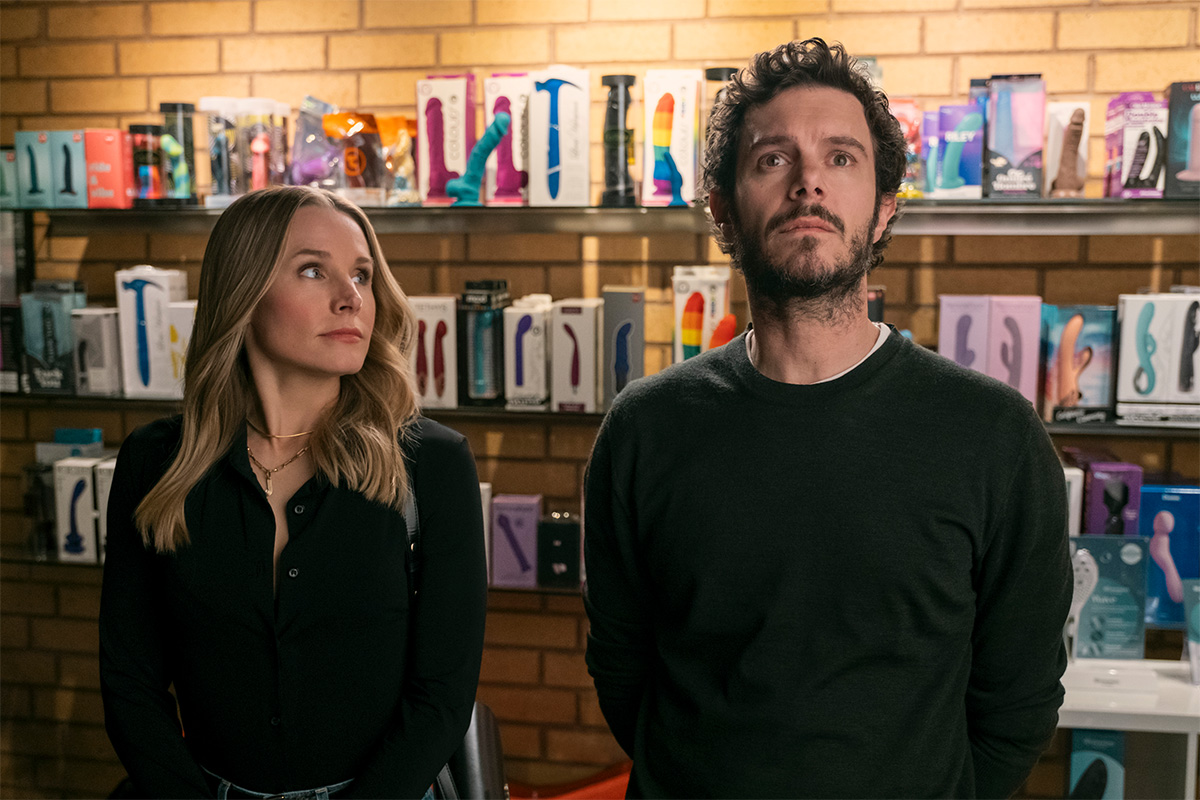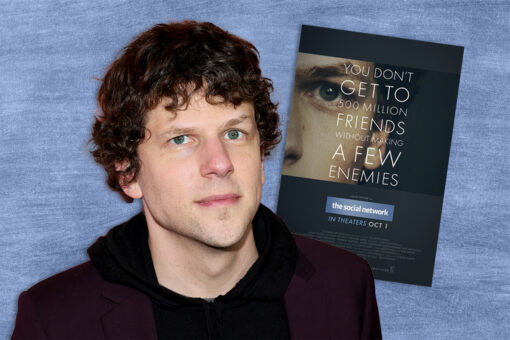Editorial Note: Spoilers ahead for the Netflix show “Nobody Wants This.”
When it comes to representations of Judaism in TV or movies, accuracy can make or break how Jewish viewers respond to it. RogerEbert.com called “You People,” the 2023 Netflix movie about a white Jewish man and a Black Muslim woman getting married, a “stunning misfire,” and I think most Jews would agree. Eschewing authenticity, co-writers Jonah Hill and Kenya Barris leaned into tired stereotypes like the overbearing Jewish mother and included misinformation which implies that Jews controlled the trans-Atlantic slave trade. Meanwhile, a show like “Jewish Matchmaking” is relatively loved in the Jewish community for its commitment to reminding viewers that there are so many different ways to be Jewish in a thoughtful, semi-educational way.
Enter “Nobody Wants This.”
The long-awaited rom-com series features Adam Brody as the steamy Rabbi Noah who falls in love with Joanne (Kristen Bell), a fiercely agnostic woman, much to the dismay of his family and community. The season follows the couple as they navigate their interfaith relationship — which includes Noah introducing Jewish rituals and culture like Shabbat, Jewish summer camp and havdalah — and how it fits into their families and their careers. But just how accurate is the show’s representation of Judaism and Jewishness?
I performed an extremely thorough fact-check on every episode of “Nobody Wants This” so you don’t have to. Sure, Rabbi Steve Leder of Wilshire Boulevard Temple in LA was a consultant on this show and vetted everything, but I’m a Jewish women with opinions and knowledge of my own. Here’s everything I found:
Episode 1 (Pilot)

Claim #1: All rabbis are middle-aged guys with beards.
Context: When Joanne enters her friend Ashley’s party and learns there’s a rabbi in attendance, she immediately assumes the middle-aged guy with a beard was the rabbi.
Verdict: Baruch Hashem, no! Rabbis can and do come in all forms.
Claim #2: Rabbi Ishmael says in the Talmud that someone who engages in gossip is equal to someone who commits murder.
Context: At the dinner table, the party guests ask Noah for rabbinic wisdom about whether or not someone should tell their friend if they know that friend is being cheated on. In his response, Noah cites the Talmud.
Verdict: This is true! According to Arakhin 15b, “Rabbi Ishmael said: ‘One who engages in gossip is guilty of a sin equal to the three prohibitions for which a Jew must accept death–idolatry, adultery, and murder.’”
Claim #3: Being a rabbi is hot.
Context: “It’s hot, right?” Noah asks when Joanne discovers he’s the rabbi and not the middle-aged bearded guy.
Verdict: Yes, Rabbi Noah/Adam Brody. Being a rabbi is hot, and it is also very specifically hot that you, Rabbi Noah/Adam Brody, are a rabbi.
Claim #4: Rabbis can have sex.
Context: When Joanne leaves the party, Noah escorts her to her car. The pair are flirting which prompts Joanne to ask if Noah can even have sex.
Verdict: Yes, rabbis can have sex!
“Judaism is generally very positive about sex, regarding it as a divine gift and a holy obligation — both for the purposes of procreation and for pleasure and intimacy,” My Jewish Learning offers in an article titled “Judaism and Sex: Questions and Answers.” “So vital is sexual activity considered to Judaism that celibacy, even for those so devoted to spiritual life that they feel they don’t have energy left for marriage and children, is frowned upon.” The article adds, “Nonetheless, Judaism doesn’t exactly take an anything goes approach to sex.”
You can read more about parameters on sex in Jewish law here.
Claim #5: Jews are trying to repopulate a people.
Context: After Noah tells Joanne that he can have sex, he also says that a couple consisting of a rabbi and a non-Jew would be “hard to pull off” because Jews need to repopulate.
Verdict: Kind of?
Some Jews believe it is their duty to have Jewish children to make up for the 6 million Jews murdered during the Holocaust. Not every Jew believes this, however, and while it is considered a mitzvah to “be fruitful and multiply,” repopulating because of the Holocaust hasn’t been written into Jewish law, and there are plenty of Jews who cannot or choose to not have children.
Claim #6: Baked into the Jewish experience is wrestling with what God is or isn’t.
Context: Joanne tells Noah that she doesn’t believe in God and then winces, asking, “Is that offensive to say to a rabbi?” He responds with the idea that Judaism is all about questioning God.
Verdict: Yes, Jews are supposed to wrestle with God!
In the Torah portion Vayishlah, patriarch Jacob literally wrestles with an angel representing God. God then changes Jacob’s name to Israel which translates as “to struggle with God.” “The Torah is saying that to struggle with God is common. Most people require inquiry and study, as adults, to come to terms with their personal encounter,” Fred Claar writes for My Jewish Learning. “Jews are not asked to accept complete faith blindly. Jews are encouraged intellectually to encounter God within themselves after studying the wrestling our sages encountered in their journeys to God. It is possible to be a good Jew and have questions about God. In Judaism, actions are more important than faith.”
Claim #7: Giving a sermon on Shabbat is a big deal.
Context: After walking Joanne to her car, Noah tells Joanne that he’s giving a sermon that Friday evening at Temple Chai. Joanne has a lukewarm response and Noah responds that it’s a big deal.
Verdict: This one is subjective, but I’d say that anytime a rabbi or any person stands in front of their congregation and offers wisdom it’s a big deal.
Claim #8: The phrase “There’s a fiddler on the roof” is rabbinical.
Context: Before Joanne gets into her car, she asks Noah to “say something rabbinical” to which he jokingly responds, “There’s a fiddler on the roof.” Joanne then says, “Don’t be funny. That’s not helping.”
Verdict: I know this one is a joke, but for the sake of being thorough I’m including it. “Fiddler on the Roof” is a Broadway musical based on stories by Jewish writer Sholem Aleichem. “Fiddler on the Roof” is not in the Torah, the Talmud or any other ancient Jewish texts. So it’s not necessarily a rabbinical phrase nor is it really a funny joke, but it is Jewy!
Claim #9: During Shabbat services, the cantor will sing a prayer, the rabbi will light candles and then go into the sermon, and then the service is over.
Context: The next scene cuts to a Friday night Shabbat service. We hear the cantor sing the last few notes of a prayer (ending on a wild high note) as Noah lights the Shabbat candles on the bimah. He then gives a short sermon and the service ends.
Verdict: Every synagogue does services differently. However, I’m a bit perplexed by the order of events happening at Temple Chai. The cantor sings “ham’varech et amo yisrael bashalom,” which is part of the last line of the prayer “Shalom Rav.” (The full lyric means “Blessed are you Adonai, who blesses Your people Israel with peace.”) Typically, “Shalom Rav” is said after a silent prayer in the Amidah (the standing prayer). However, the lighting of the Shabbat candles typically would’ve been one of the first rituals done at a Friday night service and we also didn’t see Rabbi Noah or the congregation say the proper blessing over the lighting of candles. A sermon is typically given towards the end of a service, however, there are usually prayers like Kaddish and the Aleinu which are said afterwards.
Claim #10: Congregants will schmooze with the rabbi after services, including trying to introduces their single daughters to them.
Context: Immediately following the service, Rabbi Noah is bombarded with Temple Chai members trying to talk to him. This includes a non-zero number of Jewish mothers trying to introduce him to their daughters.
Verdict: In my experience, yes, the rabbi is usually swamped with congregants trying to talk to them after Shabbat services and at any Jewish event for that matter. This scene does lean a bit on the overbearing, matchmaking Jewish mother stereotype to portray the crowd as entirely moms trying to set up their daughters with the rabbi, though I’m sure it happens.
Claim #11: You can tell who or who isn’t Jewish by looking at them.
Context: When Rabbi Noah finally makes it through the crowd of people to say hi to Joanne, his mother Bina spots them. When Noah’s sister-in-law Esther asks who Noah is talking to, Bina responds, “A shiksa.” However, Bina has never met Joanne before and is basing this comment purely on her appearance.
Verdict: You cannot! Jews can be any and all races, genders, ethnicities. This includes thin, blonde women!
Episode 2 (A Shiksa Walks Into a Temple)
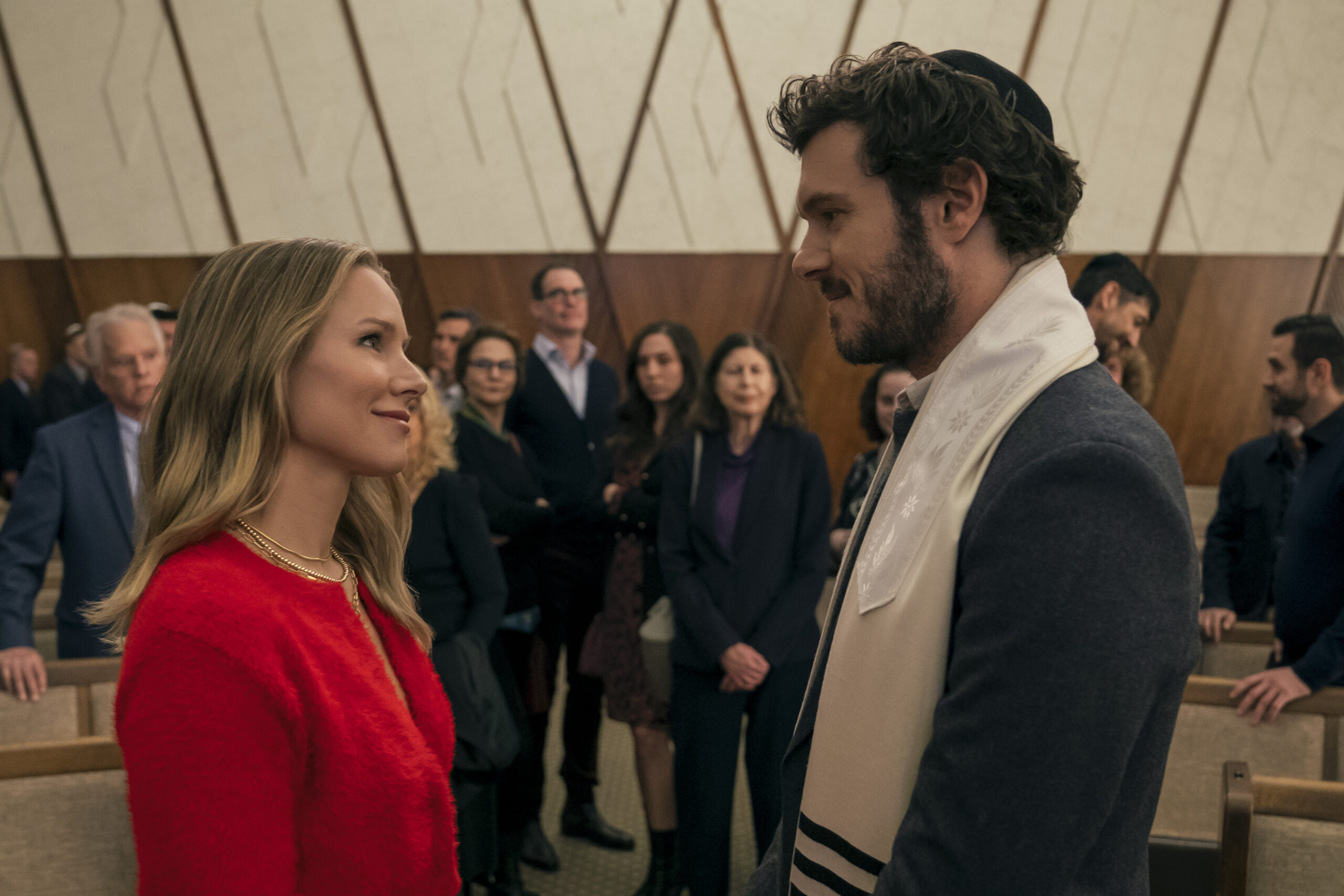
Claim #12: Temples have memberships
Context: Noah approaches Joanne in the sanctuary and asks “Are you a member of this temple?” Joanne responds, “You guys do memberships? Is there a gym?”
Verdict: While I cannot speak for every synagogue, I’d say most (if not all) have membership dues which help pay for things like clergy and staff salaries, building up-keep, events at the synagogue, etc.
Claim #13: Jews don’t workout
Context: In response to Joanne asking if there’s a gym at Temple Chai, Noah jokes, “We don’t workout.”
Verdict: Again, I know this is joke. However, for the sake of being thorough, Jews do workout! The stereotype that Jews are not athletic is disproven time and again by phenomenal Jewish athletes. You can find a list of just a few here.
Claim #14: Jews don’t do the sign of the cross.
Context: Joanne crosses herself as she goes to wait for Noah outside of the synagogue. “That’s not us,” Noah tells her.
Verdict: This is correct. The sign of the cross, which evokes the crucifixion of Jesus and the holy trinity, is associated with Christianity. Because Joanne touches her left shoulder first, the sign of the cross she performs is associated with Roman Catholicism. (Eastern Orthodox Christians touch their shoulders right to left.) The only Jewish sign or gesture I’m aware of is the hand symbol done during the priestly blessing. (You might be more familiar with it as the Vulcan salute — Jewish actor Leonard Nimoy borrowed it for his character.)
Claim #15: Jewish parents care about whether their child’s partner is Jewish, and if they have an academic degree.
Context: After Joanne leaves, Noah’s parents Bina and Ilan approach him and get the sense that there’s chemistry between their son and Joanne. Bina is clearly upset that Noah is talking to a non-Jewish woman and Ilan asks if Joanne has a degree.
Verdict: This moment plays into stereotypes about Jewish parents being afraid of intermarriage and also the value of higher education in the Jewish community. While obviously not all Jewish parents care about these two things, there are certainly a number of Jewish parents who do.
Claim #16: Parents kvell to the rabbi over their kids.
Context: Noah continues to chat with congregants before going to meet Joanne. One is insistent that he watch a trailer for her son’s documentary about the history of documentaries.
Verdict: Yes, of course this happens.
Claim #17: There’s no loitering in front of synagogues.
Context: As Joanne waits for Noah outside, a member of the temple approaches Joanne and tells her that there is no loitering in front of the temple and asks her to leave.
Verdict: Again, I can’t speak for all synagogues. But generally, most synagogues now have heightened security due to rising incidences of antisemitic violence. It’s realistic that synagogue staff members might get nervous about someone they don’t know hanging out in front of a synagogue. Though, due to racial biases that the Jewish community is not immune from, I have a hard time believing a white woman like Joanne would be deemed a threat.
Claim #18: It’s disrespectful for a Jewish man to date a non-Jewish woman.
Context: Noah leaves the synagogue to go hang out with Joanne. His brother Sasha feels left out and so he uses this excuse with his wife to join in. He tells her, “I’m going to shut this shiksa shit down. OK? It’s just disrespectful.”
Verdict: There will be no interfaith relationship slander in this house! It is not inherently disrespectful for a Jew to date a non-Jew.
Claim #19: Noah “doesn’t look that Jewish.”
Context: Joanne, her sister Morgan, Noah and Sasha pile into Morgan’s car to go get a drink. Joanne charges her phone via Morgan’s car, so when Morgan texts her, the Bluetooth speaker reads the text aloud. The text says, “He’s cuter than I expected. He doesn’t look that Jewish.”
Verdict: Once again, you can’t tell who is Jewish by just looking at them. However, Noah’s response to this moment is pitch perfect. “If I may inquire, what does Jewish look like to you?” Noah asks. “Are you picturing a bigger nose? Or like, curlier hair?” Sasha joins in, “Does my brother not look like he could control the media?”
Claim #20: There are very attractive Jews in the world like Paul Rudd and young Mandy Patinkin.
Context: After ribbing Morgan for her comment about his appearance, Noah tells her that there are hot Jews in the world. He and Sasha bring up Paul Rudd and young Mandy Patinkin as examples.
Verdict: This is 1000% correct. Both Paul Rudd and Mandy Patinkin are Jewish and they are both very, very attractive.
Claim #21: Shiksa is a Yiddish insult meaning impure and detestable. Nowadays, it just means you’re a hot, blonde non-Jew.
Context: At the bar, Sasha refers to Joanne and Morgan as shiksas and they ask what that means. Noah responds with the claim above.
Verdict: Not quite. The term “shiksa” does indeed derive from the Hebrew word “shekets,” which means “abomination,” “impure” or “object of loathing.” And the stereotype of a shiksa is that of a blonde, non-Jewish woman. But Noah’s analysis that the term “shiksa” is no longer derogatory is definitely off — while not all people agree, there is certainly a large swath of Jews today who believe the term is offensive.
Claim #22: Jews were discriminated against in the Soviet Union.
Context: At the bar, Noah and Joanne chat about her podcast. Noah reveals that his parents are Soviet Jewish immigrants and are very private people (unlike Joanne who shares about her life on her podcast) because of how dangerous it was to be openly Jewish in the USSR.
Verdict: Jews have been discriminated against basically everywhere. But yes, Soviet Jews were discriminated against. Per the UN Refugee Agency, “Throughout Russian and Soviet history the Jewish population was the subject of official policies of isolation, control or forced assimilation.” The Soviet government denied many Soviet Jews the ability to emigrate elsewhere, leading to many of them being called “refuseniks.” However, immigration policies began to relax in the 1980s. 291,000 Soviet Jews left the country between 1970 and 1988, and an additional 400,000 Soviet Jews left the country between 1990 and 1991.
Claim #23: Sometimes Christians try to “recruit” Jews.
Context: The next morning, Noah’s family holds an intervention about Joanne. Ilan offers that maybe Joanne is a Christian trying to convert Noah.
Verdict: Yes, Christian mission work sometimes specifically targets Jews to try to get them to convert. You can read more about that here.
Claim #24: Jews only date non-Jews for fun, not for serious relationships.
Context: “Noah, you had your fun. You tested it out and… it’s not what you want,” Bina tells her son during the conversation.
Verdict: False! Interfaith relationships can and are equally as serious as relationships between two Jews.
Claim #25: A congregation could not take a rabbi seriously if they’re dating a non-Jew.
Context: “I’m sure you already know that no one could take a rabbi seriously who is dating a shiksa,” Bina says after Noah says he thinks everyone is being dramatic.
Verdict: Unfortunately, this is dependent on the congregation. While it is my personal belief that it should not be a problem for a rabbi to date a non-Jew, some congregations probably would have a problem with it.
According to a 2022 article from Moment Magazine, Independent, Humanist, Renewal and Reconstructionist denominations allow and are accepting of rabbis and spiritual leaders being married to non-Jews. Interfaith marriages and households are common within the Reform Jewish movement, and there’s no rule technically prohibiting a rabbi from being in an interfaith relationship. However, Hebrew Union College, the Reform movement’s rabbinical seminary, only dropped its ban on ordaining and admitting students in interfaith relationships in 2024. Meanwhile the Conservative, Modern Orthodox and Orthodox branches of Judaism do not recognize the legal validity of Jewish intermarriage.
Claim #26: Rabbis do marriage counseling.
Context: Noah facilitates a one-year marriage counseling check-in with a couple in his congregation.
Verdict: Yes, this is not an uncommon practice, though not all rabbis offer marriage counseling services.
Claim #27: A rabbi and a non-Jewish woman come from very different worlds.
Context: Noah and Joanne meet for dinner just as friends to discuss how to possibly make a relationship work. “You and I come from such different worlds,” Noah tells Joanne.
Verdict: I’m calling bullshit here! I could maybe understand this sentiment if Rabbi Noah was Modern Orthodox or Orthodox. But he’s clearly either Conservative, Reform or another branch of Judaism that is less traditional than Orthodoxy. Noah fits pretty well into the secular world! Yes, Jewish culture and society is slightly different from the secular world but I don’t think they are as different or at least as incompatible as the show makes them out to be.
Claim #28: Rabbis can’t eat bacon.
Context: At dinner, Noah orders a salad with no bacon. Meanwhile, Joanne orders extra bacon.
Verdict: The Jewish dietary laws of kashrut dictate what Jews are allowed or aren’t allowed to eat. Land animals that chew cud and have split hooves are kosher. For example, a cow is kosher. However pigs don’t chew cud, meaning that pork and bacon are not kosher. While Orthodox, Modern Orthodox and Conservative rabbis would be expected to keep kosher, my guess is that Reform, Reconstructionist, Renewal and Humanist rabbis are not obliged to keep kosher. But of course, Noah can do what he wants.
Claim #29: Jews say “L’chaim” instead of “cheers” when having a drink.
Context: Joanne says “L’chaim” when clinking glasses with Noah.
Verdict: This is correct! (Though not all Jews do this, nor do Jews have to do this every time they cheers.) “L’chaim” means “to life” in Hebrew and is often said when clinking glasses or during a celebration.
Claim #30: A rabbi is always on call.
Context: After dinner, Noah and Joanne kiss and Noah gets a phone call. “It’s work. Unfortunately, a rabbi is always on call,” Noah tells her.
Verdict: This is basically true. As community leaders, rabbis have pastoral duties such as when a congregant or family member of a congregant dies, is born or has some sort of emergency.
Episode 3 (Either Aura)
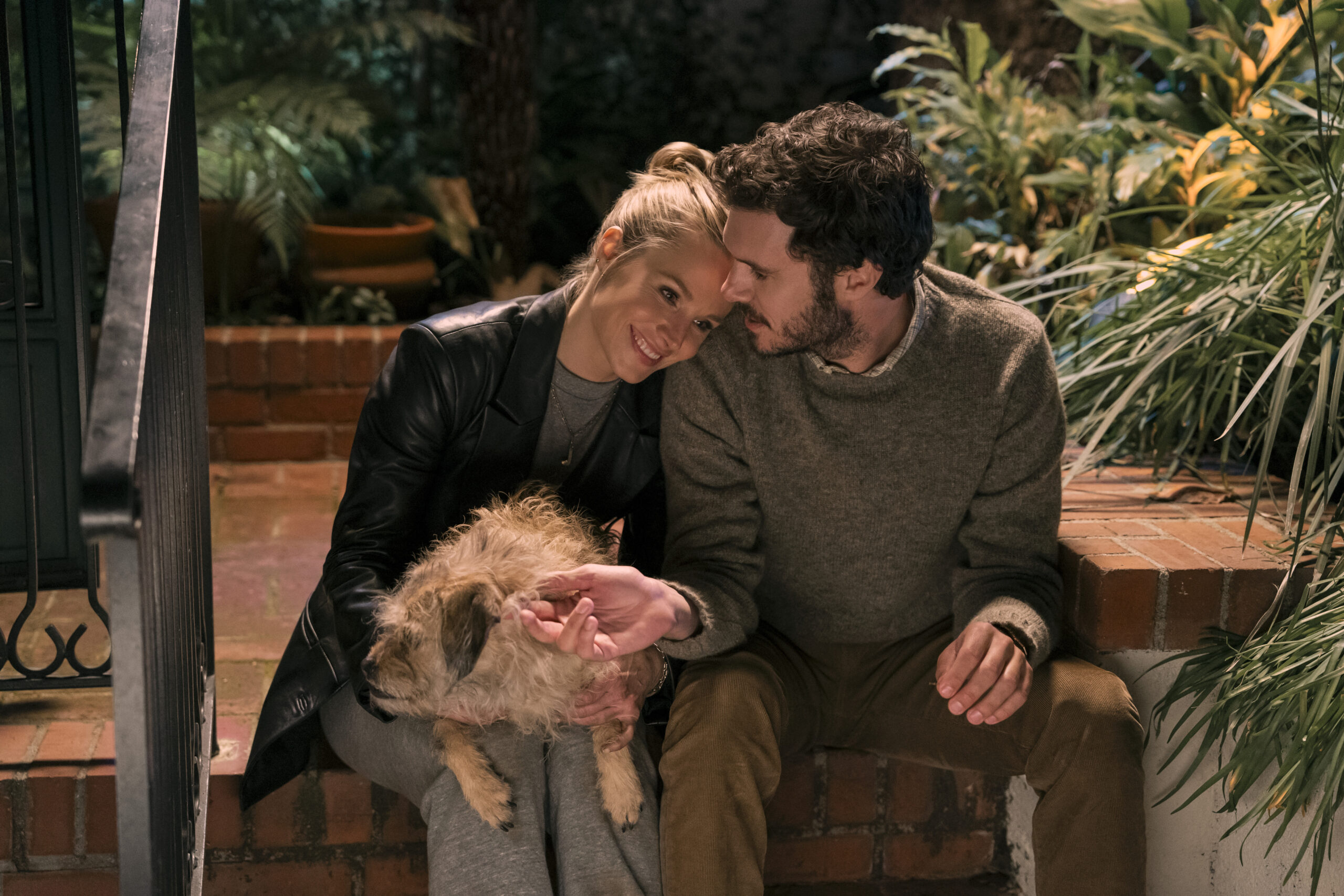
Claim #31: Jews have to go to Jewish hospitals.
Context: When Noah arrives at the hospital to check on Rebecca, the signage indicates that she is at a Jewish facility called Beth Israel Hospital. This isn’t a direct claim by the show, but it seems to implicate that Jews go to Jewish hospitals.
Verdict: What? No. While some Jews choose to go to Jewish or historically Jewish medical institutions or see Jewish doctors because they feel more comfortable with someone from within their own community, it’s not a requirement. Also, while we’re here, that plot line in “Grey’s Anatomy” where an Orthodox woman refuses a heart valve replacement because the replacement came from a pig and would not be kosher is also untrue.
Claim #32: Rabbi Noah/Adam Brody is cute, but not “leave this Earth because you dumped someone cute.”
Context: Noah meets Sasha outside the hospital and learns that his ex Rebecca was in a car accident. Noah asks if the accident was intentional and Sasha responds, “You’re cute, but not leave this Earth because you dumped someone cute.”
Verdict: Self-harm is no joke, full stop. But I’ll just say that Noah/Adam Brody is pretty damn cute.
Claim #33: People who are close to God have such powerful auras.
Context: Morgan and Joanne meet with an aura reader for their podcast. They talk about Rabbi Noah and the aura reader suggests that he has a strong aura.
Verdict: Maybe? Who’s to say. I tried Googling this, found myself on a weird side of the internet and got spooked.
Claim #34: Jews love to rib each other.
Context: In the hospital, Noah and Rebecca’s parents chat. When Ilan returns and announces that the nurses say Rebecca is going to be fine, Anatoly, her dad, says, “Suddenly he’s a doctor.” Ilan then explains that he would’ve gone to medical school had his older brother not died of typhoid. “I filled out all the forms and everything,” Ilan explains. Anatoly jabs back, “You hear that? He filled out the forms.”
Verdict: Jews, especially older Jews, love to kvetch at others. This is a sacred part of Judaism. The highest form of kvetching is kvetching about someone not being a doctor.
Claim #35: It’s just a phase for a Jew to date a non-Jew.
Context: In the waiting room, Rebecca’s mom Yulia asks Noah if he’s “come to his senses.” “Of course you have,” Bina responds for him. “I told you that this is just a phase.”
Verdict: Once again, no!!!
Claim #36: Being a rabbi or a spiritual leader of any religion makes you a good person.
Context: When Joanne talks with her mom and Morgan, Morgan implies that she and Noah are a weird pair because Joanne is a bad person. “We’re just saying that you’re, like, sort of a bad person relative to a man of God,” Morgan says.
Verdict: Being a rabbi or a spiritual leader of any religion does not inherently make someone a good person.
Claim #37: Jewish guilt is a thing.
Context: At the hospital, Esther tries to guilt Noah into taking back Rebecca. Noah says that she’s being a bit heavy on the Jewish guilt and Esther says she’s doing it intentionally.
Verdict: Jewish guilt is indeed a thing! Guilt plays a huge part in Jewish culture from Yom Kippur to literature like “Portnoy’s Complaint” to the idea that Jews are neurotic and anxious.
Claim #38: A mitzvah is a good deed.
Context: On her way home, Joanne rescues a stray dog from the street. Noah is on her front step when she arrives home and tells Joanne that she did a mitzvah, meaning that she did a good deed.
Verdict: Yes, but there’s more! While a mitzvah is often referred to as a good deed, the word technically means “commandment.” You know, as in the 10 Commandments. (Though there are actually 613 commandments in Jewish law.)
“It is not simply a ‘good deed,’ for example, to refrain from murdering or stealing. And similarly, the mitzvot that deal with feeding the poor, acting kindly to the stranger, or observing the Sabbath are much more significant in the Jewish tradition than mere divine suggestions on how to be good,” My Jewish Learning explains. “Mitzvot are commandments, traditionally understood to come from God and to be intended for the Jewish people to observe.”
Episode 4 (Obliterated)
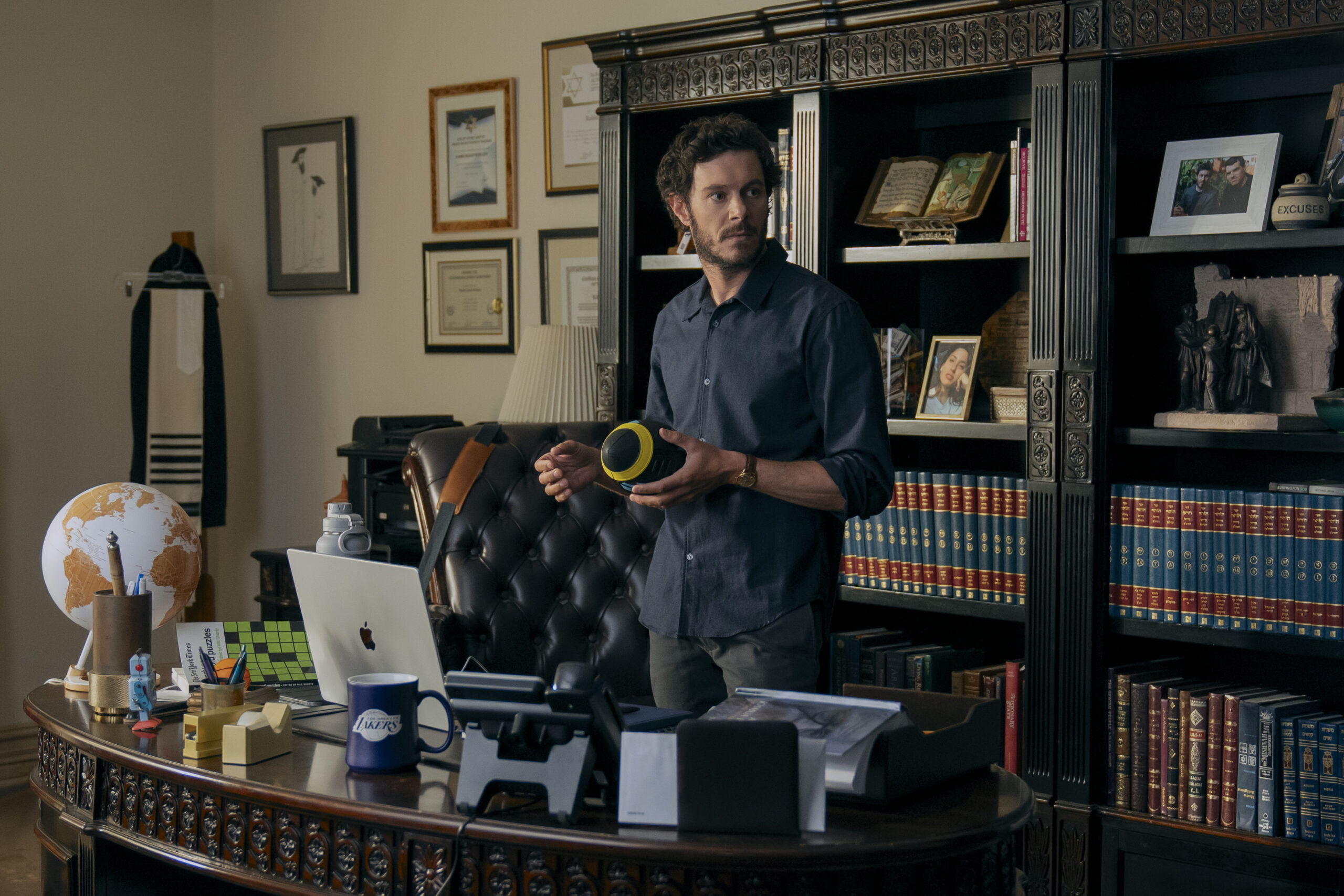
Claim #39: Jewish men should only have fun with non-Jewish women and should marry non-fun Jewish women.
Context: Before Noah and Joanne go out on a date, a friend of Noah’s brings him a pile of condoms. Then, the friend refers to Joanne as a rebound. Noah argues that she’s not a rebound and that she’s more than just a little fun. “We love fun,” his friend says. “But do we end up with fun?”
Verdict: AHHHHHH NO. Interfaith relationships can be serious and Jewish women can be fun!
Claim #40: Miriam’s crush Caleb has a Haftarah tutor and goes to Haftarah class.
Context: Sasha and Esther’s daughter Miriam is forced to go to Sasha for help when Esther is out. Miriam needs help because her friend texted her crush that she likes him and they have 30 minutes to figure out how to unsend the message before he gets out of his Haftarah class.
Verdict: Per My Jewish Learning, “Traditionally, on Shabbat and holiday mornings, a selection from one of the biblical books of the Prophets is read after the Torah reading. The portion is known as the haftarah.” During a b-mitzvah, some Jewish kids will have to chant both a Torah portion and a corresponding haftarah portion. (No, even though Torah and haftarah sound the same, they are not.) So I guess a specific haftarah tutor and haftarah class can exist. But, in my experience, my b-mitzvah tutor worked with me on both my Torah reading and my haftarah reading. So while a haftarah tutor could be a real thing, my guess is that the writers meant a Torah tutor.
Claim #41: It’s a big deal for a rabbi to be in a sex shop.
Context: Joanne needs to buy a vibrator for her podcast and has Noah come with her. In the shop, Noah runs into someone from the board of his congregation, Mr. Goldberg, and freaks out.
Verdict: Rabbis are allowed to have private lives!! While it’s certainly awkward for a rabbi and a congregant to run into each other in a sex shop, there’s no prohibition against it. So basically, if you see your rabbi or a rabbi in a sex shop, mind your business.
Claim #42: The Hebrew word Chai is spelled C-H-A-I.
Context: Joanna googles Mr. Goldberg to try to reach out to him and explain the situation. She asks Noah how to spell chai.
Verdict: This is the correct transliterated spelling of “chai,” though not all Hebrew words have only one correct English spelling (see: Hanukkah, Chanukah, Hanuka, etc.). In Hebrew, “chai” is spelled חי or chet-yud.
Claim #43: Schmuck is a derogatory word.
Context: As Noah leaves work, Temple Chai Head Rabbi Cohen tells him that Mr. Goldberg called to give a huge donation to the synagogue. Rabbi Cohen called Mr. Goldberg “a cheap schmuck.”
Verdict: This is true. “Schmuck” is a Yiddish word which is literally a vulgar word for “penis.” It refers to someone who is idiotic, obnoxious or contemptible.
Episode 5 (My Friend Joanne)
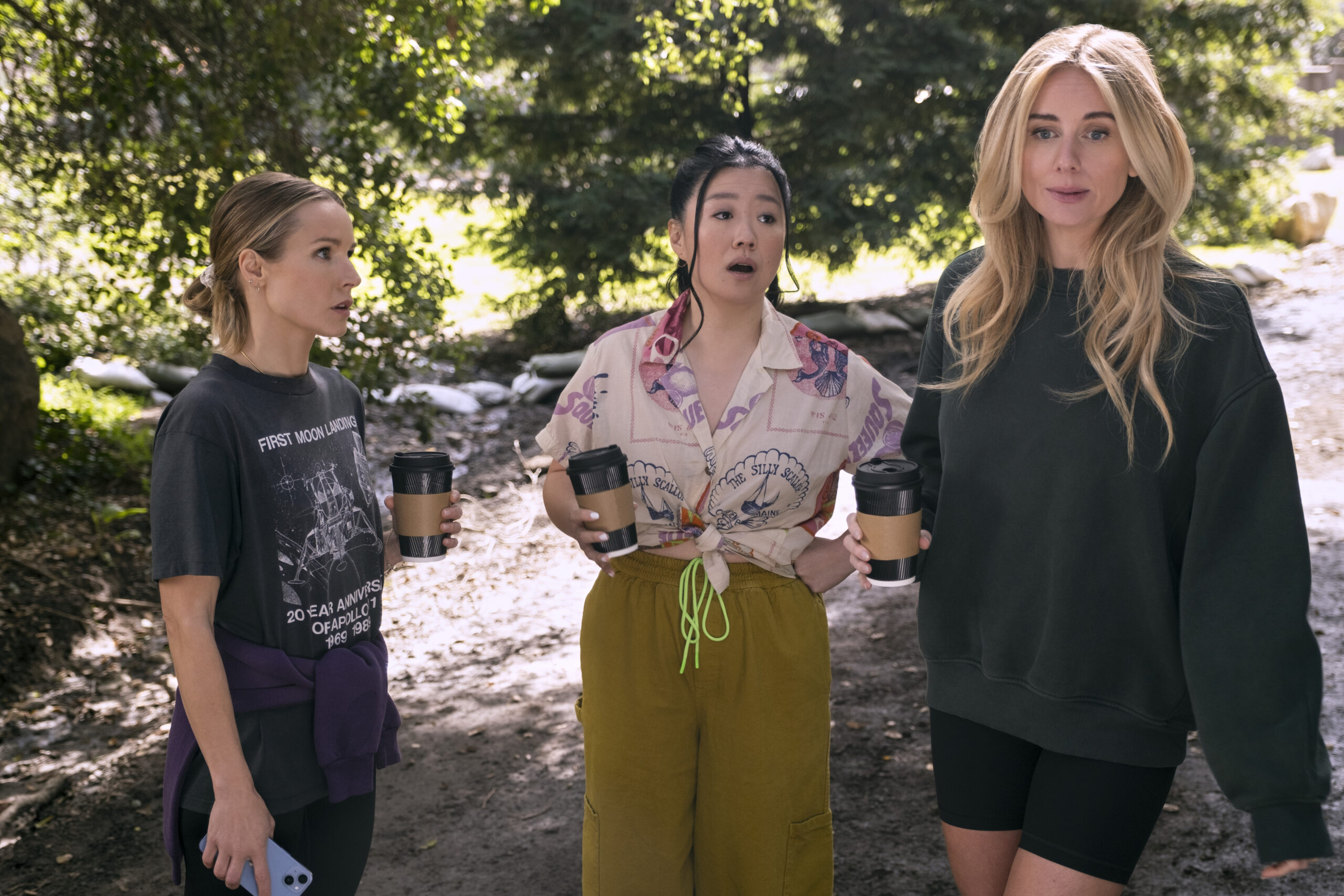
Claim #44: Rabbis can get called away for a weekend to teach one Torah study at a Jewish summer camp.
Context: On the eve of their first weekend getaway together, Noah is asked last-minute to fill in teaching one Torah study at a Jewish summer camp.
Verdict: I mean I guess this is a possible scenario, but it feels a bit implausible.
Claim #45: There’s a Jewish summer camp in Ojai, California.
Context: Noah says that the camp he has to go to is in Ojai.
Verdict: This is actually true! Camp Ramah in California is located in Ojai. Though the name of the summer camp Noah is going to is called Camp Haverim.
Claim #46: Jewish summer camp takes place during fall.
Context: The season is never explicitly stated, but it’s pretty clearly fall when Noah and Joanne go to the summer camp. Noah is wearing a flannel, for crying out load.
Verdict: Most people spend time at Jewish summer camps during the summer, duh. But some synagogues or Jewish youth organizations could very well host a fall retreat at a Jewish summer camp. This whole scenario is a bit confusing, however, given that it’s not really specified what event is happening at this camp when it can’t be a summer session.
Claim #47: A Jewish summer camp could be called Camp Haverim.
Context: The name of the camp is called Camp Haverim.
Verdict: Theoretically, yes! “Haverim” or “Chaverim” literally means “companions.”
Claim #48: Kids sing Hebrew songs at camp.
Context: At camp, Joanne and Noah walk around. They listen to a circle of kids singing while a counselor strums a guitar.
Verdict: This is very authentic and perhaps the most Jewish summer camp thing one can do. Some of the greatest hits include “Oseh Shalom,” “Hevenu Shalom Aleichem” and Debbie Friedman’s “Not by Might, Not by Power.”
Claim #49: Shalom means “hello,” “goodbye” and “peace.”
Context: Joanne meets Rabbi Shira at camp, Noah’s former camp counselor. She says “Shalom,” and Joanne asks what it means. Rabbi Shira responds that shalom means “hello,” “goodbye” and “peace.”
Verdict: Rabbi Shira tells no lies.
Claim #50: Women can be rabbis.
Context: The sheer introduction of Rabbi Shira adds the claim that women can be rabbis.
Verdict: Yes, yes, a thousand times yes!
In 1935, Rabbi Regina Jonas was the first woman to be officially ordained as a rabbi. She was ordained through the Reform movement. Additionally, Rabbi Sally Priesand became the first woman rabbi in the United States in 1972 after she was ordained by the Reform movement. Women have been ordained at serve as rabbis in many branch of Judaism, including Reform, Conservative, Reconstructionist, Renewal, Humanist, etc. The issue is more complex for Orthodox Judaism, however. Sarah Hurwitz is considered to be the first ordained Orthodox female rabbi, and there are others. However, the issue of women being rabbis is not accepted as a whole by Orthodox Jews.
Claim #51: You’re supposed to sit with your crush on the bus to Jewish summer camp.
Context: Joanne talks to some teens at the camp and a girl named Shoshana explains a situation wherein a guy said he liked her, but would’t sit with her on the bus to camp.
Verdict: Yes, of course. Like at secular summer camp, at Jewish summer camp you are supposed to do any and all activities with your crush so everyone knows that you have one.
Claim #52: A person can be the “Jewish Jesus.”
Context: Sasha tells Morgan that Noah is “the Jewish Jesus.”
Verdict: Jesus was actually himself Jewish, so the term “the Jewish Jesus,” which implies that he wasn’t, is wrong.
Claim #53: Jewish summer camp has an outdoor buffet-style spread for meals.
Context: In one scene, we see Noah getting bagels for himself and Joanne in a beautiful outdoor food area that appears to have food trucks.
Verdict: I’ve literally never seen a summer camp cafeteria that looks this nice, but I’ve never been to Ojai.
Claim #54: Non-Jews can join Torah study.
Context: Joanne tells Noah that she’s going to be there to watch him lead Torah study.
Verdict: Generally speaking, Torah study is a practice that is welcome to all.
Claim #55: Sundown Friday to sundown Saturday is a day of rest called Shabbat. During this time, Jews are commanded not to work and to spend time with family.
Context: At a candle-making workshop at camp, Rabbi Shira teaches Joanne about Shabbat.
Verdict: True. You can read more about Shabbat on My Jewish Learning.
Claim #56: Women can wear kippot too.
Context: On Shabbat, Rabbi Shira and Noah talk about Joanne. In this scene, Rabbi Shira wears a kippah.
Verdict: While historically wearing a kippah, or a skullcap headcovering, has been a practice for men, women can and do wear kippot as well.
Claim #57: Women were not allowed to be rabbis until like 50 years ago and Judaism has been around for thousands of years.
Context: Noah tells Rabbi Shira that he really likes Joanne, despite the fact that he might get pushback from the head rabbi. And Rabbi Shira responds that Judaism has been around for a very long time and only recently could women become rabbis — meaning that change is OK!
Verdict: True. Judaism originated roughly in the 6th century BCE and only in the 20th century did women first have the opportunity to become rabbis.
Claim #58: There are numerous interpretations as to why Jews light two candles for Shabbat, including that they represent the destroyed Temples.
Context: After his conversation with Rabbi Shira, Noah goes after Joanne, who left the camp when he tried to hide her from the Head Rabbi. They do Shabbat together at a bar, lighting two candles while Noah explains that there are many interpretations to the reason why Jews light two candles on Shabbat. He says his favorite explanation is that the candles represent the two Temples that were destroyed and they serve as a reminder that Shabbat can happen anywhere.
Verdict: I have actually never heard this interpretation before. Per My Jewish Learning, “At least two candles should be lit [on Shabbat]. These represent “shamor” [“keep”] and “zakhor” [“remember”], the first words of the commandments [in the two Ten Commandments passages in the Torah] concerning Shabbat (Exodus 20:8; Deuteronomy 5:12). They also symbolize the unity underlying all apparent duality, such as man and woman, body and soul, speech and silence, creation and revelation.”
That isn’t to say that Rabbi Noah’s interpretation is necessarily incorrect — Jews inflect their own meanings into ritual all the time. It just doesn’t seem to be a commonly accepted or thought of interpretation.
Claim #59: Shabbat can happen anywhere.
Context: Rabbi Noah tells Joanne this when explaining the Shabbat candles.
Verdict: Yes! You do not need to be in a specific place to celebrate Shabbat. However, if you’re ever in a place where the sun never sets, here’s some advice on how to celebrate Shabbat.
Claim #60: The correct prayer over Shabbat candles is “Barukh atah Adonai Eloheinu melekh ha’olam asher kid’shanu b’mitzvotav v’tzivanu l’hadlik ner shel Shabbat.”
Context: This is the prayer Rabbi Noah recites over the candles they light.
Verdict: Yes, this is the correct Shabbat prayer. However, their Shabbat is abridged as they did not say the prayers over the wine prayer or the bread.
Episode 6 (The Ick)

Claim #61: Rabbis/Jews have sex through a hole in a sheet.
Context: Ashley reveals that the podcast has been doing poorly recently and Morgan tries to convince Joanne to talk about her relationship with Noah on air. “I know you’re having freaky rabbi sex through a hole in a sheet. And the world deserves to know,” Morgan pleads.
Verdict: No, this is a wholly false and very weird myth. According to My Jewish Learning, it might have started because of tzitzit, which Jews are supposed to wear.
“The Torah commands that any four-cornered garment have ritual fringes attached, but since we don’t commonly wear such garments any longer, the custom emerged of wearing a tallit katan — or ‘little tallit’ — under one’s shirt in order to fulfill this commitment,” the site explains. “The sight of such garments — which are rectangular in shape and have a large hole cut in them for the head — may have been mistaken in an earlier era for the mythic sheet with a hole through which Orthodox couples supposedly copulated.”
Claim #62: You can’t be Jewish or a rabbi if you have a thick neck, tattoos and/or a light criminal record.
Context: In a store, Morgan points out a guy who has a thick neck, tattoos and a possible criminal record to Joanne who is “way more [her] type.” Because Noah is Jewish and a rabbi, the implication is that Jews can’t or don’t have those things.
Verdict: Thick-necked Jews and rabbis exist! Though the Torah prohibits a person from incising marks on themselves, from which rabbis and scholars have derived a general prohibition against tattooing, Jews with tattoos very much exist. Rabbis with tattoos also exist — Rabbi Elliott Kukla, for example — though I would imagine that no Orthodox or Conservative rabbis publicly have tattoos. And Jews can have a criminal record. See: Bernie Madoff. There is also an entire Wikipedia page dedicated to “Rabbis convicted of crimes.” But, obviously, this is not encouraged. And, at least the Central Conference of American Rabbis (of the Reform Movement) and the Rabbinic Assembly (of the Conservative Movement) have procedures for suspending, censuring or expelling rabbis who violate their ethical codes of conduct.
Claim #63: A Jewish household might have the cookbooks “Modern Jewish Cooking” by Leah Koenig and “Sababa” and “Shabbat” by Adeena Sussman in their kitchens.
Context: A scene in Esther and Sasha’s home reveal these cookbooks on the kitchen counter.
Verdict: True! Though I’d also recommend “Koshersoul” by Michael W. Twitty.
Claim #64: Parents list their job titles on a bat mitzvah announcement.
Context: Esther is filling out a form for Miriam’s bat mitzvah announcement which requires Sasha’s job title. This provokes a conversation wherein Sasha plans to ask his father for a promotion.
Verdict: I’ve literally never heard or seen this happen before. My best guess is the writers just needed an inciting incident for Sasha to ask for a promotion.
Claim #65: Jewish men go to the schvitz.
Context: Sasha goes to talk to his dad about his job, which requires him to go to the schvitz.
Verdict: I can’t speak for every Jewish man, but the schvitz is definitely a part of Jewish culture and particularly Russian Jewish culture. There’s an entire section about the schvitz in Noah Rinsky’s “Old Jewish Men’s Guide.”
Claim #66: Rabbis are supposed to keep kosher.
Context: Noah joins Morgan and Joanne to watch “Vanderpump Rules” and bring snacks, which leads Morgan to question whether or not rabbis need to keep kosher.
Verdict: See Claim #28.
Claim #67: Wiggling your fingers and saying “Hava Nagila” will make something kosher.
Context: Noah (jokingly) tells Morgan that he can just bless certain food to make it kosher and then performs the above action to make Pirate’s Booty kosher.
Verdict: “There is a prevalent misconception that kosher reflects the conferring of a blessing on food by a Rabbi. There is no truth to this whatsoever,” Star-K Kosher says on their site. “The barometer of kosher and non-kosher depends on two variables: the source of the ingredients and the status of the production equipment. Kosher certification, which is the guarantee that the food meets kosher requirements, revolves around these two criteria.”
Claim #68: Pirate’s Booty is kosher.
Context: After doing his fake kosher blessing, Noah tells Joanne that Pirate’s Booty is already kosher.
Verdict: This is true. Per Hershey, the company which makes Pirate’s Booty, all Pirate’s Booty products are certified kosher by the Orthodox Union.
Claim #69: NJBs like to impress the parents.
Context: Noah soon realizes that Joanne’s parents will be joining them to watch “Vanderpump” and freaks out. “No one is more important than parents,” he says, before running to change out of his sweats and get more snacks.
Verdict: This feels pretty accurate to me. Jewish culture places heavy emphasis on respecting your parents and elders. See: The Fifth Commandment.
Claim #70: Smacking with leaves (venik) is a real thing that happens at the schvitz.
Context: Ilan asks Sasha to smack him with a dried bundle of leaves.
Verdict: Yes! This treatment with the venik is common practice in Russian bathhouses; it makes sense that the Roklovs would go to a Russian bathhouse as they are from the former USSR. The felt hats Sasha and Ilan are wearing are also commonly worn at schvitzes.
Claim #71: Noah is wearing a sportcoat, not a blazer.
Context: When Noah returns to Joanne’s, he’s wearing something over his sweatshirt. Joanne asks if it’s a blazer and he tells her it’s a sportcoat.
Verdict: Correct! Sportcoats have patterned cloth, while blazers are a solid color with metallic buttons.
Claim #72: Lynn is a Hebrew name.
Context: When Joanne’s mom meets Noah, she tells him that her name Lynn is Hebrew.
Verdict: I can’t find any evidence of that being true. Per Wikipedia, “Lynn” has English and Welsh origins.
Claim #73: “Oy vey, a Jewish rabbi” is something someone might say when meeting a rabbi when they’ve never met a rabbi or a Jew before.
Context: Lynn also says this upon meeting Noah.
Verdict: Yep, this very cringe statement checks out.
Claim #74: Noah looks like Billy Joel.
Context: Yet another thing Lynn says upon meeting Noah.
Verdict: I actually think Noah looks a lot more like Adam Brody of “The O.C.” fame.
Claim #75: Noah is dressed as a hip youth pastor.
Context: Joanne says this to Morgan when they go into the kitchen to put away the giant bouquet of flowers Noah brought.
Verdict: True, the sportcoat + basketball short combo does feel very youth pastor.
Claim #76: “Putz, “chutzpah” and “boychikeleh” are all real words Jews use.
Context: These words are thrown around when Sasha and Ilan are in the cold plunge.
Verdict: These words are all Yiddish, so yes, Ashkenazi Jews like the Roklovs would use them. A “putz” is a fool, “chutzpah” is extreme self-confidence or audacity and “boychikeleh” is a term of endearment typically for boys and men.
Claim #77: A synagogue can marry two gay people and converts to Judaism, but not a Jew and a non-Jew.
Context: Joanne’s dad’s boyfriend asks Noah if he could perform a gay wedding and Noah responds that he could marry gay people and converts, but not a Jew and a non-Jew.
Verdict: The Reform, Conservative, Reconstructionist, Renewal and Humanist branches of Judaism all allow for gay Jewish weddings and weddings where one or more of the partners is a convert. Orthodox Judaism will recognize a wedding between a Jew and a convert if the convert has gone through the Orthodox Jewish conversion process. Generally speaking, Orthodoxy would not allow for a gay wedding, however a growing number of Modern Orthodox rabbis are performing same-sex nuptials.
As for interfaith weddings: Reconstructionist, Humanist and Renewal rabbis can perform interfaith weddings. There’s no official stance from the Central Conference of American Rabbis on whether rabbis can perform interfaith weddings, however Reform rabbis are discouraged from doing so. Conservative and Orthodox Jewish rabbis are not permitted to perform interfaith weddings.
Claim #78: Converts are considered the closest to God.
Context: Noah says this when explaining which weddings he can and cannot perform.
Verdict: I’ve definitely heard this said before, but I can’t find a definitive source on it. At the very least, people who convert to Judaism (also known as Jews by choice) are supposed to be treated the same as born Jews.
Claim #79: You’re supposed to say “mazel tov” when you say goodbye.
Context: Morgan says this to Noah when she thinks Joanne is going to break up with him. (It’s clearly a joke, but hey, I’m being very thorough here.)
Verdict: Nope! An actual way to say “goodbye” in Hebrew is “Shalom” or “Lehitraot.” (We’ll get into what “Mazel tov” means in just a second…)
Episode 7 (WAGS)
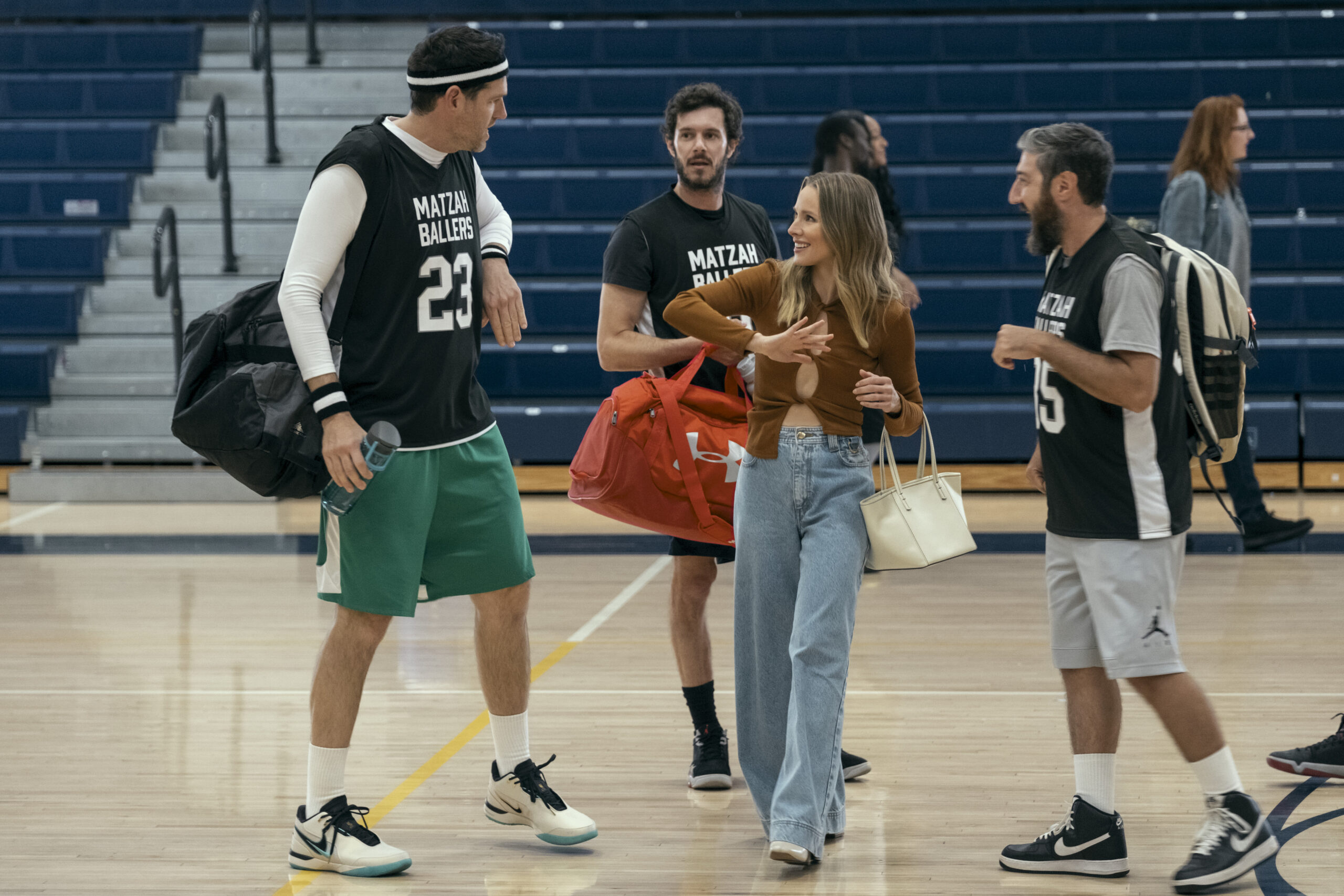
Claim #80: Jewish men are into basketball.
Context: After meeting Joanne’s friends, Noah tells Joanne that she should meet his friends during their basketball game. Noah is clearly very excited about it, telling Joanne that he plays in a basketball league and their team name is the Matzah Ballers.
Verdict: While subjective, this feels very true. There are plenty of Jewish basketball stars: Sue Bird, Amar’e Stoudemire and Adam Sandler to name a few.
Claim #81: The Matzah Ballers is a good basketball team name.
Context: Joanne lightly mocks Noah for his team name, but he insists that it’s good and cool.
Verdict: I agree with Joanne that Matzah Ballers is a bit of a dorky name. It’s also not super original. But men are allowed to have hobbies that they care about and therefore I am supportive of Rabbi Noah/Adam Brody playing on a team called the Matzah Ballers.
Claim #82: Rachel, Talia, Leah and Esther are all Jewish names.
Context: Noah introduces the WAGS (wives and girlfriends) of the Matzah Ballers. Their names are Talia, Rachel, Leah and Esther.
Verdict: This is pretty spot on. Rachel and Leah are anglicized versions of the names of two Jewish matriarchs. Esther is the anglicized version of the Jewish Queen Hadassah, from the Purim story. And the name Talia has Hebrew origins, meaning “dew from God.” All are common Jewish names for women.
Claim #83: “Mazel tov” means congratulations.
Context: After the basketball game, Joanne tells Noah that Esther almost smiled at her. His response is, “Mazel tov.”
Verdict: Essentially, yes. According to My Jewish Learning, “Mazel tov” or “Mazal tov” literally means “a good constellation,” implying that the recipient is experiencing good fortune because the stars have aligned for them. So basically, it means good luck. But in practice, “mazel tov” is typically used to mean “congratulations” and is often heard at festive occasions.
Episode 8 (Rebecca’s Box)

Claim #84: Zendaya’s name is pronounced Zen-dye-ah.
Context: Rabbi Cohen asks Noah this when he steps into Noah’s office.
Verdict: Wrong! Via Zendaya herself, it’s Zen-day-a.
Claim #85: Jews are the best at suffering.
Context: Head Rabbi Cohen reveals that he’s retiring. “What’s the temple going to do without you?” Noah asks. “Probably suffer,” Cohen responds, “But that’s what we do best.”
Verdict: Hell yeah! Jews have entire holidays dedicated to suffering and love to dramatically remember how we suffered. This is our strong suit.
Claim #86: Head rabbis aren’t allowed to date non-Jews because then Jews will become extinct.
Context: Rabbi Cohen simultaneously tells Noah he wants to put him forth as a head rabbi and confronts him about dating a non-Jew. “If our congregation sees its head rabbi eat a crab cake,” Rabbi Cohen says, “everyone marries a goy, then there are no more Jewish children, and then our people become extinct.”
Verdict: Rabbis are supposed to be seen as examples in the community, so this is an authentic reason for why a rabbi wouldn’t be allowed to date a non-Jew. However, I disagree with the sentiment and do not believe that intermarriage is a threat to Judaism.
Claim #87: You should ask your partner to convert to Judaism because of your job.
Context: Rabbi Cohen says he would recommend Noah to become head rabbi if he’s seeing a Jewish woman and suggests he ask Joanne to convert.
Verdict: No!! Talmudic scholars suggest that all conversions should be “for the sake of Heaven.” “In fact,” My Jewish Learning goes on, “the rabbis did not accept conversions to accommodate another’s wishes or of to achieve social or economic gain.”
Claim #88: Gefilte fish is not fun.
Context: Rabbi Cohen tells Noah to introduce Joanne to the fun parts of Judaism and says, “Do not let her try gefilte fish.”
Verdict: Gefilte fish is a lot of things, but I agree. It is not fun.
Claim #89: Havdalah is a ceremony to mark the end of Shabbat and is “seriously slept on.”
Context: Noah decides to teach Joanne about Havdalah to try to get her interested in Judaism. Sasha doesn’t remember what havdalah is, however, and Noah has to explain it to him.
Verdict: True! Shabbat ends when you can see three stars in the sky, and then you perform a ceremony called Havdalah. “Our rabbis teach that on Shabbat we are given an extra soul. At Havdalah we relinquish that extra soul, but hope that the sweetness and holiness of the day will remain with us during the week,” My Jewish Learning offers. “We take a cup of wine, a box of spices and a beautiful braided Havdalah candle, and we sing or recite the blessings.” And yes, compared to other rituals or holidays like Shabbat and Passover, it is probably lesser known, especially to the non-Jewish community.
Claim #90: “Bubbe” is a name for Jewish grandmothers.
Context: At a dress fitting for her bat mitzvah, Miriam calls Bina “bubbe.”
Verdict: Yes this is correct, though “bubbe” is a specifically Yiddish word. Other Jews, particularly Sephardi or Mizrahi Jews, might use the Hebrew word “savta” instead.
Claim #91: NYC is a perfect bat mitzvah theme.
Context: Miriam keeps bemoaning the fact that her theme is New York City. Meanwhile, Bina and Esther keep trying to convince her it’s cool.
Verdict: The perfect theme is actually God. But NYC is pretty good. New York is a cultural center where lots of Jews live.
Claim #92: “Shiksas are just for practice.”
Context: Bina says this to Rebecca at the dress fitting.
Verdict: There we go! I have been waiting all season for someone to finally just say this phrase. Unfortunately, this phrase is something almost every Jew has heard before and it’s misogynistic and rude. Once again: Interfaith relationships are valid!!
Claim #93: Jews love being comfortable more than anyone.
Context: Joanne changes into sweats for the Havdalah dinner, instead of a dress, because she wants to be comfortable. Noah then tells her that Jews love being comfy.
Verdict: I’m going to deem this as true. Jews love to kvetch, which I think points to the fact that we desire comfort.
Claim #94: “Where the Crawdad’s Sing” is in Reese’s Book Club.
Context: Rebecca and Morgan meet at a bar, where Rebecca is reading alone.
Verdict: This is true. But should it be…?
Claim #95: It’s not OK to have candy pills on tables at a “Euphoria”-themed bat mitzvah party.
Context: At the Havdalah dinner, Miriam explains that she wants a cool bat mitzvah theme. She does this by saying that her friend Sami had a “Euphoria”-themed bat mitzvah party with candy pills on the table. “OK, that’s not OK,” Esther responds.
Verdict: Going to be a Jewish killjoy here and say I agree with Esther!!
Claim #96: A bat mitzvah shouldn’t be about the theme.
Context: “A bat mitzvah is a very, very important rite of passage and it’s about standing on the shoulders of powerful Jewish matriarchs,” Noah tells Miriam during their conversation about theme.
Verdict: Thank you, hot rabbi!! Yes, a b-mitzvah is a ceremony in which a young person becomes an adult in the Jewish world. The least important part is the party.
Claim #97: We love Ruth.
Context: In talking about powerful Jewish women, Noah brings up Ruth. “You know, Ruth didn’t start out as a Jew. But we love her.”
Verdict: In the Book of Ruth, we learn about a Jewish woman named Naomi and her daughter-in-law Ruth, who decides to follow Naomi back to Israel and become a Jew. It’s a beautiful story of companionship, Jewish conversion and yeah, it’s a little queer-coded. So yes, we love Ruth.
Claim #98: There’s no basketball involved in Havdalah.
Context: Joanne, trying to remain true to herself, tells Noah that she will participate in Havdalah but doesn’t like basketball. She says this because in the last episode she went all out on being a basketball WAG. Noah responds by telling her that there is no basketball in Havdalah.
Verdict: I can confirm there is no basketball in Havdalah, nor any other Jewish ritual. Sad.
Claim #99: Miriam’s bat mitzvah dress is embarrassingly long.
Context: Joanne checks on the status of Rebecca’s box in the bedroom where Miriam is watching TV on her iPad. She shows Joanne a photo of her bat mitzvah dress and asks this question. Joanne says it is.
Verdict: Yeah, an ankle-length dress is tough for a 13-year-old.
Episode 9 (My Girl Bina)

Claim #100: Through Torah the world can be a safer and more meaningful place.
Context: Joanne asks Noah why he became a rabbi, and Noah explains that as a nervous little kid, he found comfort in the lessons of the Torah and Jewish ritual and tradition. “It allowed me to view the world as a much safer and more meaningful place.”
Verdict: OK first, awwww. That’s such a wholesome response. And yes, I’d say that’s true. The Torah is full of Jewish wisdom about how to live and be in community with one another, and Jewish rituals bring Jewish community closer together. Though, obviously, every Jew places different significance on the Torah and ritual.
Claim #101: Jewish boys are ultra-close to their mothers and Jewish moms love their sons the best.
Context: In advance of meeting Noah’s family, Joanne asks, “Is it true what they say about Jewish boys and their moms?” To which Noah replies, “I mean, we’re pretty close.”
Verdict: To be fair, this moment isn’t stating the stereotype about Jewish men being momma’s boys but rather poses the question. Still, I think it’s important to take a moment to point out that it is indeed a stereotype. While it can be true for some Jewish boys/men and their mothers, it’s not true for all.
Claim #102: Prosciutto is pork.
Context: Joanne brings a charcuterie board to brunch with Noah’s family as a gesture of goodwill. However, the charcuterie board has prosciutto on it, which Joanne thinks is fancy Italian beef. Noah and his family explain to her that it is pork.
Verdict: Prosciutto is indeed pork. (Specifically, it’s an uncooked, unsmoked, dry-cured ham that’s typically thinly sliced. The food has its origins in Italy.) As we already established, pork is not kosher.
Claim #103: A bat mitzvah is “a beautiful simcha.”
Context: The family talks about Miriam’s upcoming bat mitzvah and Ilan says this to Joanne.
Verdict: This is correct! “Simcha” is a Hebrew word meaning “gladness” or “joy.” (It’s sometimes used as a name!) And a b-mitzvah should be an exciting time for a young person becoming a Jewish adult and their family.
Claim #104: Jews eat chopped liver/pâté.
Context: When the family sits down to brunch, Noah tells Joanne that she has to try some of Bina’s homemade pâté and feeds it to her.
Verdict: Of course not all Jews eat chopped liver, but chopped liver is a dish associated with Ashkenazi Jewish cuisine. “Many have speculated that because Jews were often poor, they ate every part of a chicken in order to be thrifty, including parts like the liver that would otherwise seem unappetizing,” Tamar Fox writes in an article for The Nosher. “It may be that chopped liver was common among German, Polish, or Russian non-Jews at one point, and the recipe was simply adopted by the Jewish community in those countries.”
Claim #105: You might call your significant other “bubala” or “bubeleh.”
Context: After brunch, Noah urges Joanne to invite Morgan to dinner in efforts to repair their relationship. Sasha asks what they’re fighting about and Joanne says, “Nothing. She’s just a lying bitch who’s trying to get in between me and my bubala.”
Verdict: This is true. “Bubala” or “bubeleh” is a Yiddish term of endearment meaning “darling,” “honey” or “sweetheart.” Anecdotally, I feel like I most often hear it used by grandmothers describing their grandchildren, but using it to talk about your partner isn’t wrong.
Episode 10 (Bat Mitzvah Crashers)

Claim #106: Yeastie Boys is a bagel pop-up.
Context: Joanne and Noah get coffee and food from a truck which reads “Yeastie Boys.”
Verdict: True! Yeastie Boys is an LA-based bagel shop and truck started by Jew Evan Fox.
Claim #107: Joanne can just “be Jewish.”
Context: Joanne explains to her friends that Noah asked her to convert and her friend Ryann (D’Arcy Carden) says Joanne should just “be Jewish.” She adds, “It’s perfect because it’s not like you stand for anything or have any strong beliefs.”
Verdict: Conversion to Judaism is actually a very lengthy process! It sometimes takes many years of study. It also requires a candidate for conversion to stand before a rabbinic court or beit din and either be circumcized or immersed in the mikveh.
Claim #108: Conversion requires you to study for two years and possibly wear a wig. There’s also the ability to become a Jew in six weeks.
Context: Joanne’s friends google how to become Jewish and find mixed results.
Verdict: There’s not a specific timeline for conversion set by Jewish law, but I doubt any rabbi would allow someone to convert within six weeks. And some Jewish women cover their hair with wigs or head coverings, but only after they are married. And, this is a practice mainly done by Orthodox Jewish women.
Claim #109: You can also say “matzah!” when cheersing.
Context: Ryann says this after Joanne decides to convert.
Verdict: Oh, Ryann. You sweet, summer child. No, that doesn’t make any sense. Matzah is unleavened bread that Jews typically eat on Passover.
Claim #110: Miriam’s bat mitzvah swag doesn’t make sense.
Context: Sasha and Esther get ready for Miriam’s bat mitzvah and Sasha claims that the party favors don’t make sense. Esther then holds up a sweater that says, “Apple + Pizza + Jewish star = Miriam!”
Verdict: The sweatshirt is definitely a confused statement, but it’s so accurate to how nonsensical all b-mitzvah merch is, it’s painful.
Claim #111: “Tribing up” is a commonly used phrase to describe Jewish conversion.
Context: Sasha uses this when talking to Noah about Joanne.
Verdict: I’ve never heard this before, but people often do say, “Welcome to the tribe.” So, you know, close enough.
Claim #112: Jews aren’t supposed to gossip.
Context: Sasha tries to tell Noah something about Morgan and Joanne, but Noah won’t hear it. “I don’t engage in gossip, lashon hara,” Noah says.
Verdict: This is technically true. Lashon hara, which literally means “evil speech,” is a Jewish prohibition against spreading gossip or saying something damaging against someone.
Claim #113: Someone’s stance on lashon hara might change if the gossip is about them.
Context: After Noah says he doesn’t gossip, he asks Sasha, “Is it about me?” Sasha responds, “Oh, would it change your opinion about gossip if it was about you?”
Verdict: …From personal experience I can say yes.
Claim #114: B-mitzvah parties typically have a DJ and a grand entrance for the b-mitzvah child.
Context: This happens at Miriam’s bat mitzvah. She enters in her dress and hands out apples to guests.
Verdict: The entrance doesn’t always happen, but having a b-mitzvah DJ is basically written into Jewish law at this point.
Claim #115: You might hear “Crank That (Soulja Boy)” at a b-mitzvah.
Context: Joanne and Morgan enter the bat mitzvah party to this song.
Verdict: You certainly did at all the late aughts and 2010s b-mitzvah parties I went to.
Claim #116: There’s a bat mitzvah service before the party.
Context: Noah tells Joanne that Miriam did a great job at her bat mitzvah service.
Verdict: While some people might just have the party, a child literally becomes a bat mitzvah, bar mitzvah or b’nai mitzvah during the religious ceremony. This usually includes leading a service, reading Torah and/or Haftarah and giving a d’var Torah, or a sermon about that week’s Torah portion.
Claim #117: It’s important to really think about converting and be spiritually ready to do so.
Context: Joanne tells Noah that she’s going to convert and this is his response.
Verdict: I mean, yeah, but Noah, you’re only saying this now?! After pressuring her to convert if she wants to stay in this relationship? Come on.
Claim #118: People do the hora to “Hava Nagila” at a bat mitzvah party.
Context: This is shown happening at Miriam’s party.
Verdict: Yep! The hora is a wedding dance, but also happens at other celebrations including most b-mitzvahs.
Claim #119: Kya is the murderer in “Where the Crawdads Sing.”
Context: At the bat mitzvah, Morgan confronts Rebecca about lying to her. In retaliation, she tells Rebecca how “Where the Crawdads Sing” ends.
Verdict: This is true. Sorry for spoilers but also that book came out over five years ago now, so this is really on you.
Claim #120: Friends of the b-mitzvah child give embarrassing speeches at a bat mitzvah party.
Context: One scene shows a child giving a speech, saying that she and Miriam are “plant mother twins.”
Verdict: Once again, this is so real it hurts.
Claim #121: You don’t want to peak at 13.
Context: In her speech, Joanne tells kids to embrace their awkward teen years.
Verdict: This is great advice! Your b-mitzvah should be fun, but also it should be weird. Let it happen!
Claim #122: Jews are full of surprises.
Context: Noah and Joanne slow dance. Joanne then says that she didn’t realize bat mitzvahs were romantic, and Noah responds with the above sentiment.
Verdict: Yes, but not in an antisemitic conspiracy theory kind of way. More in a, “We’ve survived for thousands of years against all odds” kind of way.
Claim #122: After you convert you get to choose a new Hebrew name.
Context: While Noah and Joanne slow dance, he begins to talk about her conversion. He tells her that she will get to choose a new Hebrew name, though she doesn’t have to use it.
Verdict: This is correct!
Claim #123: Meeting with a beit din, going to the mikveh, learning Hebrew and learning about tzedakah are all parts of the conversion process.
Context: Noah continues to talk about Joanne’s conversion and throws all these words at her.
Verdict: Yes, as I previously mentioned, meeting with the beit din is a part of the conversion process, as is going to the mikveh, if you’re a woman. It’s not required that you’re fluent in Hebrew (ancient or modern) to convert, but conversion classes will certainly teach someone the basics of the Hebrew language. And a convert will also learn about tzedakah, or justice.
Claim #124: Bashert means “meant to be.”
Context: Noah says that Joanne’s conversion is “bashert.” When she asks him what that means, he tells her it’s “meant to be.”
Verdict: This is true. “Bashert” is a Yiddish word which means “destiny.” It is often used to describe someone’s soulmate, but can also refer to a fortuitous event.
Claim #125: Being a Jewish adult means you get to decide for yourself what’s right and what’s wrong.
Context: Rabbi Noah tells Miriam this during a blessing at the party.
Verdict: This is true!
Claim #126: Kiddush happens at a bat mitzvah party.
Context: Miriam pours a glass of wine and there are lit candles at a table at the party. Rabbi Noah then leads Kiddush.
Verdict: It’s not required, but I suppose it could if the party ends just as Shabbat is beginning. The prayer that Rabbi Noah says is the correct blessing over the wine.
Claim #127: Being with a rabbi means you represent the temple and people look to the rebbetzin, or rabbi’s wife, as an example.
Context: Joanne and Rebecca confront each other outside of the bat mitzvah party. Rebecca tells Joanne that Noah being a rabbi isn’t just his job, it’s his whole life. And that being Mrs. Head Rabbi (aka the rebbetzin) is also kind of a job.
Verdict: Rabbis are representative of their synagogues and people certainly do look to the rabbi’s wife as an example. However, I’m going to say something controversial yet brave. In our modern world, a rabbi’s spouse probably has their own job and shouldn’t be forced into unpaid physical or emotional labor for the synagogue that they might not want to do just because they are married to a rabbi!
Claim #128: There’s so much free shit at bat mitzvahs.
Context: Morgan says this to Sasha at the party.
Verdict: This isn’t always the case because not all Jewish families are wealthy enough to give away free things and host a lavish b-mitzvah party. However, this can be true.
Claim #129: Macaroons are commonly served for dessert at a bat mitzvah.
Context: Rabbi Cohen hands Noah a dessert plate which consists of a red velvet cupcake, a black-and-white cookie and what appears to be a couple of macaroons.
Verdict: If the bat mitzvah is happening over Passover then yes. Otherwise, no.
Claim #130: There are so many beautiful things about Judaism.
Context: Joanne says this to Noah when she admits she’s not ready to convert yet or ever.
Verdict: This is subjective but I say it’s very true. Judaism rocks.
Claim #131: Noah can’t both be a head rabbi and date a non-Jew.
Context: Noah runs after Joanne and tells her this and then kisses her, implying he’s choosing her over being a rabbi.
Verdict: For one last time, interfaith. relationships. are. valid. If Joanne and Noah really want to be together and Noah really wants to be a head rabbi (considering he’s clearly not Orthodox), I honestly think he could make it work.
Final Thoughts
Whew! If you’re reading this, you made it through the entirety of the fact-check. Mazel tov! After meticulously watching every episode of this show multiple times, I have to say, I think “Nobody Wants This” does a beautiful job of portraying Judaism. The vast majority of claims about Jewish rituals and Hebrew/Yiddish words were correct. At the same time, I think it does rely on stereotypes about Jewish women to create conflict and heightened moments of comedy, which is definitely tedious at times and feels a bit inauthentic. Overall, I give 3.5 out of 5 hot rabbis.
Tap here for more “Nobody Wants This” coverage from Kveller’s Jewish TV Club.
